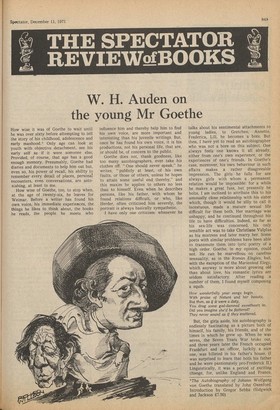W. H. Auden on the young Mr Goethe
How wise it was of Goethe to wait until he was over sixty before attempting to tell the story of his childhood, adolescence and early manhood.* Only age can look at youth with objective detachment, see his early self as if it were someone else. Provided, of course, that age has a good enough memory. Presumably, Goethe had diaries and documents to help him out but, even so, his power of recall, his ability to remember every detail of places, personal encounters, even conversations, are astonishing, at least to me.
How wise of Goethe, too, to stop when, at the age of twenty-six: he leaves for Weimar. Before a writer has found his own voice, his immediate experiences, the things he likes to think about, the books he reads, the people he meets who influence him and thereby help him to find his own voice, are more important and interesting than his juvenile writings. But, once he has found his own voice, it is his productions, not his personal life, that are, or should be, of concern to the public.
Goethe does not, thank goodness, like too many autobiographers, ever take his clothes off. "One should never speak," he writes, "publicly at least, of his own faults, or those of others, unless he hopes to attain some useful end thereby," and this maxim he applies to others no less than to himself. Even when he describes persons, like his father, with whom he found relations difficult, or who, like Herder, often criticised him severely, the portrait is always basically sympathetic.
I have only one criticism: whenever he
talks about his sentimental attachments to young ladies, to Gretchen, Annette, Frederica, Lili, he becomes a bore. But then, I have yet to read an autobiographer who was not a bore on this subject. One always feels one knows it all already, either from one's own experience, or the experiences of one's friends. In Goethe's case, moreover, his own behaviour in such affairs makes a rather disagreeable impression. The girls he falls for are always girls with whom a permanent relation would be impossible: for a while he makes a great fuss, but presently he bolts. I am inclined to attribute this to his unusually close relationship with his sister which, though it would be silly to call it incestuous, made a mature sexual life difficult for them both. Her marriage was unhappy, and he continued throughout his life to have difficulties. Indeed, so far as his sex-life was concerned, his only sensible act was to take Christiane Vulpius as his mistress and later marry her. Some poets with similar problems have been able to transmute them into lyric poetry of a high order. Goethe, in my opinion, could not. He can be marvellous on carefree sensuality, as in the Roman Elegies, but, with the exception of the Marienbad Elegy, which anyway is more about growing old than about love, his romantic lyrics are seldom satisfactory. After reading a number of them, I found myself composing a squib.
How wonderfully your songs begin With praise of Nature and her beauty, But then, as if it were a duty, You drag some god-damned sweetheart in. Did you imagine she'd be flattered?
They never sound as if they knattered.
But, the girls aside, his autobiography is endlessly fascinating as a picture both of himself, his family, his friends, and of the times in which he grew up. When he was seven, the Seven Years War broke out, and three years later the French occupied Frankfurt and an officer, luckily a nice one, was billeted in his father's house. (I was surprised to learn that both his father and he were passionately pro-Frederick II.) Linguistically, it was a period of exciting change, for, unlike England and France,
*The Autobiography of Johann Wolfgang von Goethe translated by John Oxenford. Introduction by Gregor Sebba (Sidgwick and Jackson £7.50)










































 Previous page
Previous page